| Srl | Item |
| 1 |
ID:
151307
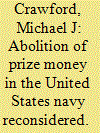

|
|
|
|
|
| Summary/Abstract |
Efforts to end prize money—monetary awards to naval personnel for the capture of enemy ships and cargoes in wartime—for the United States Navy began shortly after the War of 1812. They were redoubled following the Civil War (1861–1865). But only in 1899 did numerous particularly American motives—ideological, fiscal, pragmatic, psychological, and strategic—unite to put an end to naval prize money in the United States. In contrast, the United Kingdom maintained naval prize money for another fifty years.
|
|
|
|
|
|
|
|
|
|
|
|
|
|
|
|
| 2 |
ID:
151310
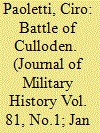

|
|
|
|
|
| Summary/Abstract |
The battle of Culloden, an encounter between armies of the Hanoverian and Stuart dynasties on a Scottish moor in April 1746, traditionally has been treated in the historiography as a strictly British affair with exclusively British consequences. This essay seeks to place the battle in a much broader framework, suggesting that it had long-term implications for not just Britain, but for much of the rest of the world as well. It contends that it is not unreasonable to argue, for example, that if the battle had been lost by the Hanoverians, the United States probably would not exist today and French would be the primary language spoken in North America.
|
|
|
|
|
|
|
|
|
|
|
|
|
|
|
|
| 3 |
ID:
151308
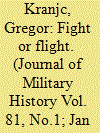

|
|
|
|
|
| Summary/Abstract |
As Slovenes were the only people to be annexed by three occupiers during World War II—Italy, Germany, and Hungary—the work offers a unique comparison of Axis policies on conscripting occupied populations and combatting desertion and draft-dodging. In Slovenia’s fratricidal guerilla war between the native Communist-led resistance, the Liberation Front, and Axis-sponsored Slovene military collaborators, these irregular units also competed to enlist men of fighting age and struggled to keep them from leaving. An examination of the motives behind the men’s decisions not to fight reveals that the rallying cry of “national duty” was often trumped by more parochial and individual concerns.
|
|
|
|
|
|
|
|
|
|
|
|
|
|
|
|
| 4 |
ID:
151304
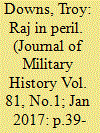

|
|
|
|
|
| Summary/Abstract |
The Indian Uprising of 1857 was the largest colonial insurrection the British had to face in the nineteenth century. Indian troops of the Bengal Native Army rose up in revolt, as did many Indian civilians, making 1857 both a military mutiny and a civil rebellion. This paper examines how the British authorities stationed at Benares (the modern city of Varanasi) managed to see off the multiple threats to their local governance. Not only were these dangers overcome, but Benares itself was to play a vital role in ensuring that the British possessed the military resources needed to defeat the insurgency.
|
|
|
|
|
|
|
|
|
|
|
|
|
|
|
|
| 5 |
ID:
151303


|
|
|
|
|
| Summary/Abstract |
This study attempts an exploratory overview of African military slavery, which is marked by the unusual longevity of the phenomenon and by its surviving social legacy. Before the colonial period military slavery was not confined (as is often supposed) to the Muslim states of North Africa and the Sahel, but was also practiced in many non-Muslim sub-Saharan societies. In the late nineteenth century the colonial powers liberated, conscripted or purchased African slave soldiers for their own armies. Although the institution of military slavery died away during the colonial period, it has re-emerged in independent Africa as child soldiering.
|
|
|
|
|
|
|
|
|
|
|
|
|
|
|
|
| 6 |
ID:
151309
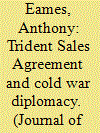

|
|
|
|
|
| Summary/Abstract |
The U.S. sale of Trident submarine-launched ballistic missile technology to Britain in 1982 resolved doubts that had emerged in the 1970s about the importance, durability, and strength of the Anglo-American nuclear partnership. But the Trident Sales Agreement did more than bring the “special relationship” out of the doldrums. It became an integral part of an Anglo-American agenda that bolstered North Atlantic Treaty Organization (NATO) unity in the face of Soviet efforts to undermine the alliance’s nuclear objectives.
|
|
|
|
|
|
|
|
|
|
|
|
|
|
|
|
| 7 |
ID:
151306


|
|
|
|
|
| Summary/Abstract |
This paper quantitatively analyzes an 1885 Dakota Territory census to draw larger conclusions about Civil War veterans who migrated to the frontier. A sample of almost 6,000 veterans suggests that a significant percentage experienced some degree of wartime trauma, needed to reestablish themselves socially and economically, and took advantage of what financial security they had when homesteading newly opened territory. They were more likely to move to newly opened counties by themselves rather than with comrades from the war, relying on prior relationships only when moving to more established regions of the frontier where those associations might prove useful.
|
|
|
|
|
|
|
|
|
|
|
|
|
|
|
|